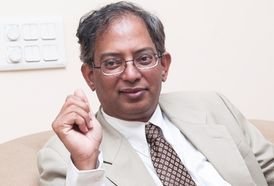Seaweeding unchartered territories
April 10, 2014 | Thursday | Features | By BioSpectrum Bureau
Seaweeding unchartered territories
Dr Shrikumar Suryanarayan
In 2007, he stepped down as the president of R&D at Biocon to become an academician at IIT-Madras. Now, with a vision to farm the seaweeds to meet growing commercial energy demands, he serves as the chairman of Sea6 Energy.
The company believes that there is an urgent requirement to replace the traditional fossil fuels with a more environmentally friendly alternative.
To achieve this, scientists at Sea6 energy are trying to convert photosynthetic biomass including plants, grasses and algae in to fuels.
He left his job at Biocon in 2008 and started teaching at IIT-Madras when a handful of students there sought his help to enter the esteemed iGEM competition at the Massachusetts Institute of Technology (MIT) in the United States.
Unfortunately, the students were denied the visas but still managed to win a prize after demonstrating their idea through a video presentation.
After this victory, Dr Suryanarayanan and the team of students began to sharply focus on biofuels. Consequently, the team attended algal biofuel conferences. Finally in 2010, seaweed became the center of everybody's thought processes, in their endeavor to discover an alternative source of fuel.
The company was started through investments made by Dr Suryanarayan himself, and as well as contributions from IIT-ians at Madras, which added up to Rs 1 crore.
Dr Suryanarayanan's interest in creating bioenergy sprung way back in the 1982, even before the world began to think on fossil fuel alternatives.
After joining Biocon in 1983, Dr Suryanarayanan proved to be an exceptional scientist. He met Dr Kiran Mazumdar-Shaw while he was pursuing his chemical engineering at IIT-Madras. She and Dr Suryanarayanan shared a common dream to create revolutionary innovation in biotechnology.
Once graduated, he was persuaded by Dr Kiran to join Biocon in its R&D endeavors. Dr Suryanarayanan is known for his unrelenting leadership at Biocon's innovation-led enzyme business.
Dr Suryanarayanan feels that seaweeds have major advantages since it has the potential to become the futuristic biofuel, and growing them requires shallow ocean waters and direct nutrients.
So far about three labs are working on macro-algal biofuel including Bio Architecture Labs, the Korean Institute of Industrial Technology and the Philippines government.
India imports about two-thirds of its crude oil at the moment. In the face of diminishing fossil fuels, their detrimental effects on the environment and phenomenal price rise, the company feels that converting photosynthetic biomass into fuels is the safe way in creating a sustainable future for the next generation.
The innovative minds at Sea6 Energy sees a future where the vast oceans will become earth's biofuel farm house.
Cultivation of seaweed is not a new technology in our society. Seaweed cultivation has been around for centuries all across the world for varied commercial purposes.
The strategic geographical location of Indian sub-continent allows it to receive rich and plentiful sunlight for plants. India has special access to vast stretches of ocean which gives it an added advantage of cultivating seaweeds at enormous scale thereby creating economic benefits.
Seaweeds were primarily a part of popular diet. However, seaweed cultivation is a laborious process and the seaweed cultivation process has remain unchanged even till this day.
The team today firstly are focusing on geographical constraints of shallow and calm seas which are indispensable for traditional seaweed farming. Also, to aid the cultivation, Sea6 Energy has come up with innovative and proprietary structures for creation of low-cost seaweed farms on the surface of the sea.
These structures would facilitate cultivation of seaweeds in turbulent waters, thus opening avenues for vast sea stretches along the coastlines for cultivators.
This altogether seem to generate massive employment opportunities for the rural population and fishing communicates along the coastal areas and sea shores.
Furthermore, Sea6 Energy is also engaged in activities to make the laborious seaweed cultivation in to a more lighter and efficient one.
This will enable cultivators to be highly productive in the cumbersome process of trying to convert seaweed farming activity from a labor intensive process into an efficient one.
Seaweed biomass have been identified to be rich in carbohydrates which can be converted in to sugars. These sugars can further be converted into alcohol and fuel through advanced techniques in biotechnology.
However, the challenge is that the chemical composition of seaweeds significantly differ from that of terrestrial plants. This needs to be tackled through developing new ways in biotechnology which can convert these carb-rich seaweeds in to sugars and then in to fuel.
The company is also relentlessly working on practical applications in reducing the use of fresh water for seaweed cultivation.
By amalgamating various proven techniques and making them fit in to the larger jig-saw biotechnology puzzle,
Sea6energy firmly believes that biofuels from seaweed can be a viable eco-friendly option for traditional liquid fossil fuels.









